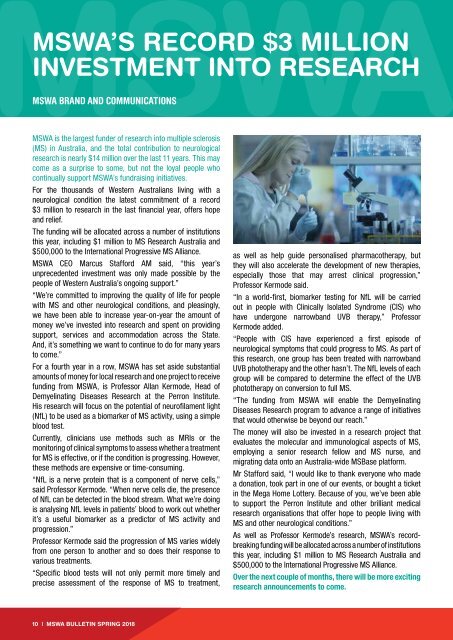You also want an ePaper? Increase the reach of your titles
YUMPU automatically turns print PDFs into web optimized ePapers that Google loves.
MSWA’S RECORD $3 MILLION<br />
INVESTMENT INTO RESEARCH<br />
MSWA BRAND AND COMMUNICATIONS<br />
MSWA is the largest funder of research into multiple sclerosis<br />
(MS) in Australia, and the total contribution to neurological<br />
research is nearly $14 million over the last 11 years. This may<br />
come as a surprise to some, but not the loyal people who<br />
continually support MSWA’s fundraising initiatives.<br />
For the thousands of Western Australians living with a<br />
neurological condition the latest commitment of a record<br />
$3 million to research in the last financial year, offers hope<br />
and relief.<br />
The funding will be allocated across a number of institutions<br />
this year, including $1 million to MS Research Australia and<br />
$500,000 to the International Progressive MS Alliance.<br />
MSWA CEO Marcus Stafford AM said, “this year’s<br />
unprecedented investment was only made possible by the<br />
people of Western Australia’s ongoing support.”<br />
“We’re committed to improving the quality of life for people<br />
with MS and other neurological conditions, and pleasingly,<br />
we have been able to increase year-on-year the amount of<br />
money we’ve invested into research and spent on providing<br />
support, services and accommodation across the State.<br />
And, it’s something we want to continue to do for many years<br />
to come.”<br />
For a fourth year in a row, MSWA has set aside substantial<br />
amounts of money for local research and one project to receive<br />
funding from MSWA, is Professor Allan Kermode, Head of<br />
Demyelinating Diseases Research at the Perron Institute.<br />
His research will focus on the potential of neurofilament light<br />
(NfL) to be used as a biomarker of MS activity, using a simple<br />
blood test.<br />
Currently, clinicians use methods such as MRIs or the<br />
monitoring of clinical symptoms to assess whether a treatment<br />
for MS is effective, or if the condition is progressing. However,<br />
these methods are expensive or time-consuming.<br />
“NfL is a nerve protein that is a component of nerve cells,”<br />
said Professor Kermode. “When nerve cells die, the presence<br />
of NfL can be detected in the blood stream. What we’re doing<br />
is analysing NfL levels in patients’ blood to work out whether<br />
it’s a useful biomarker as a predictor of MS activity and<br />
progression.”<br />
Professor Kermode said the progression of MS varies widely<br />
from one person to another and so does their response to<br />
various treatments.<br />
“Specific blood tests will not only permit more timely and<br />
precise assessment of the response of MS to treatment,<br />
as well as help guide personalised pharmacotherapy, but<br />
they will also accelerate the development of new therapies,<br />
especially those that may arrest clinical progression,”<br />
Professor Kermode said.<br />
“In a world-first, biomarker testing for NfL will be carried<br />
out in people with Clinically Isolated Syndrome (CIS) who<br />
have undergone narrowband UVB therapy,” Professor<br />
Kermode added.<br />
“People with CIS have experienced a first episode of<br />
neurological symptoms that could progress to MS. As part of<br />
this research, one group has been treated with narrowband<br />
UVB phototherapy and the other hasn’t. The NfL levels of each<br />
group will be compared to determine the effect of the UVB<br />
phototherapy on conversion to full MS.<br />
“The funding from MSWA will enable the Demyelinating<br />
Diseases Research program to advance a range of initiatives<br />
that would otherwise be beyond our reach.”<br />
The money will also be invested in a research project that<br />
evaluates the molecular and immunological aspects of MS,<br />
employing a senior research fellow and MS nurse, and<br />
migrating data onto an Australia-wide MSBase platform.<br />
Mr Stafford said, “I would like to thank everyone who made<br />
a donation, took part in one of our events, or bought a ticket<br />
in the Mega Home Lottery. Because of you, we’ve been able<br />
to support the Perron Institute and other brilliant medical<br />
research organisations that offer hope to people living with<br />
MS and other neurological conditions.”<br />
As well as Professor Kermode’s research, MSWA’s recordbreaking<br />
funding will be allocated across a number of institutions<br />
this year, including $1 million to MS Research Australia and<br />
$500,000 to the International Progressive MS Alliance.<br />
Over the next couple of months, there will be more exciting<br />
research announcements to come.<br />
10 | MSWA BULLETIN SPRING <strong>2018</strong>


















